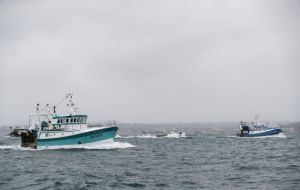MercoPress. South Atlantic News Agency
Tension between France, UK escalates over fishing licenses vs. electricity supply
 Beaune said action would be decided on within days
Beaune said action would be decided on within days French authorities have warned they would cut power supply to the United Kingdom Tuesday in the latest episode of the English Channel fisheries saga, it was reported.
After Britain left the European Union, conditions for the award of fishing licenses to French boats have changed and people who had been used to certain practices now need to accommodate to a new reality.
France's threat is aimed at putting pressure on London in the dispute over fishing licenses for French vessels, which now require a new type of license as per the 2020 UK-EU trade agreement. But Jersey, the largest of the Channel Islands and an autonomous Crown dependency, has not granted 100% of the licenses applied for. French vessels, for example, need to prove they had been operating in the area before Brexit, which has left fishermen with newer boats as both newcomers and outsiders.
“Our patience has a clear limit. That is the exasperation of our fishermen. For nine months we have been speaking calmly, kindly,” France's Secretary of State for European Affairs Clement Beaune has said.
On September 29, Jersey issued 64 full and 31 provisional licenses to French vessels. At the same time, the island turned down bids from 75 other ships. On Tuesday, 12 additional licenses were issued compared to 87 applications, well below Paris' expectations.
In this scenario, the EU could hit Britain and Jersey’s energy supply over the UK’s failure to provide sufficient fishing licences to French fishers, Beaune said. A close ally of French President Emmanuel Macron, the official also pointed out action would be decided on within days and discussions were already in motion.
Last week, only 12 licenses were granted out of 47 requests, claiming the applicants had failed to prove they had a history operating in those waters.
Beaune insisted that “we have an agreement negotiated by France, by Michel Barnier, and it should be applied 100%.”
“We will take measures at the European level or nationally to apply pressure on the United Kingdom,” he added. “We defend our interests. We do it nicely, and diplomatically, but when that doesn’t work we take measures,” he went on.
“The Channel Islands, the UK, are dependent on us for their energy supply. They think they can live on their own and badmouth Europe as well. And because it doesn’t work, they indulge in one-upmanship, and in an aggressive way.”
The UK is a net importer of energy from French nuclear power stations. Paris has previously suggested it could cut the supply to Jersey. Under the post-Brexit agreement, in case of a dispute with Jersey, the EU can take unilateral measures “proportionate to the alleged failure by the respondent party and the economic and societal impact thereof.”
Unilateral measures affecting the energy supply to the rest of the UK would also theoretically be possible but at a risky cost.
French Prime Minister Jean Castex has suggested that his government would rather appeal to an arbitration tribunal or suspend all other deals currently in force with the UK.
The trade and cooperation agreement also creates a link between continued EU access to British waters until 30 June 2026 and the UK’s access to the bloc’s electrical grid and gas network.
The energy part of the agreement allows the UK virtually unchanged access but fishing quotas will be decided by annual negotiations after 2026.
A European Commission spokesperson sought to play down the row, adding that officials in Brussels were in “constant contact with the UK authorities to ensure that all licence applications are dealt with as soon as possible”.
“We took note of last week’s announcements, but regret that with the number of licences granted it still has not been possible to bring this issue to an end now. The UK has published their methodology and we are now discussing the differences with the British and Jersey authorities regarding the rights of the boats involved. On our side, we will continue to engage in the interest of our fishermen and women so that further licences will be provided.”
Two under-sea high-voltage cables of the Interconnexion France-Angleterre (IFA) supply the UK with enough electricity to power three million homes - more than the total amount generated by British wind farms. One of these cables was damaged by fire last month, causing a spike in electricity prices amid fears it will not be back to 100 per cent until next March. In addition to the French connections, there are also similar cables linking the UK with Ireland, Belgium, the Netherlands, Germany, Denmark and Norway.
A UK Cabinet minister quoted by the MailOnline downplayed Beaune's words. claiming they were nothing but empty threats. “If France was to cut off our power supplies, we would just never use them again.”
“Why would you ever go back to a provider who did that? Trust would be gone. They would be damaging themselves in the long-term.”
Earlier this year warships aimed guns at each other off the Jersey shores and diplomatic relations between the two countries have hit a low point in recent weeks over a nuclear submarine purchase deal.
Coal was the UK's primary source of energy in the early 1900s and up until the 1940s contributed to 90 per cent of Britain's electricity generation. Natural gas, nuclear power and most recently, renewable energy, have moved to the forefront of the UK's electricity generation. By 2019, 35 per cent of energy used in the UK was imported.




Top Comments
Disclaimer & comment rulesCommenting for this story is now closed.
If you have a Facebook account, become a fan and comment on our Facebook Page!